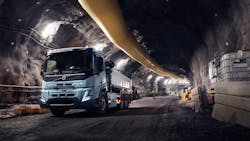Swedish miner Boliden taking two Volvo Battery-Electric Trucks underground
Metals mining firm Boliden is going to use Volvo battery-electric trucks for heavy underground duties in one of its Swedish mines.
The deal between Boliden and Volvo Trucks will deliver two battery-electrics for use in the Kankberg mine outside Skellefteå in northern Sweden, the companies reported. The first truck, a Volvo FH Electric, will transport rock bolts and other equipment down into the mine and could begin as early as this year.
“This is an exciting collaboration in an environment with very tough demands; steep slopes, heavy loads and humid air that wears on the vehicles,” says Jessica Lindholm, project manager at Volvo Trucks. “The collaboration with Boliden will give us valuable knowledge about the performance of electric trucks when driven underground, and provide answers to questions about how the driveline and batteries are affected. Reduced carbon dioxide emissions for mining transport also means that we, indirectly, will reduce our own CO2 emissions, because the mining industry's raw materials are used in our trucks.”
Boliden and Volvo estimate that if all trucks in the mine were electric, this could reduce CO2 emissions in the operations by more than 25 percent. Boliden has vowed to cut its Scope 1 and 2 (direct and those associated with energy use such as grid electricity, respectively) CO2 emissions 40 percent by 2030 compared to 2021.
The second Volvo FH Electric truck, if and when deployed in mine, would be used for underground transport of rock and ore. The Kankberg site mines for gold and tellurium.
The international mining industry is uniting on several ways to electrify and decarbonize its operations.
Several years ago, Boliden digitized and automated most of its mining operations there with help from project partners Ericsson, ABB and Volvo, according to reports. A 5G system connects the mine from excavators to haulage and other equipment, according to news reports.
Currently, exhaust gases from diesel vehicles are responsible for most of the CO2 emissions in Boliden’s mines. The company owns and operates mines in several Scandinavian countries uncovering various metals including zinc, copper and nickel and also owns smelters within the continent.
Volvo is also providing vehicles for fleet electrification for a transport firm shuttling cargo between the Ports of Los Angeles and Long Beach. The automaker and coffee giant Starbucks are plotting a network of EV charging stations from Denver to Seattle.
About the Author
Rod Walton, EnergyTech Managing Editor
Managing Editor
For EnergyTech editorial inquiries, please contact Managing Editor Rod Walton at [email protected].
Rod Walton has spent 17 years covering the energy industry as a newspaper and trade journalist. He formerly was energy writer and business editor at the Tulsa World. Later, he spent six years covering the electricity power sector for Pennwell and Clarion Events. He joined Endeavor and EnergyTech in November 2021.
Walton earned his Bachelors degree in journalism from the University of Oklahoma. His career stops include the Moore American, Bartlesville Examiner-Enterprise, Wagoner Tribune and Tulsa World.
EnergyTech is focused on the mission critical and large-scale energy users and their sustainability and resiliency goals. These include the commercial and industrial sectors, as well as the military, universities, data centers and microgrids. The C&I sectors together account for close to 30 percent of greenhouse gas emissions in the U.S.
He was named Managing Editor for Microgrid Knowledge and EnergyTech starting July 1, 2023
Many large-scale energy users such as Fortune 500 companies, and mission-critical users such as military bases, universities, healthcare facilities, public safety and data centers, shifting their energy priorities to reach net-zero carbon goals within the coming decades. These include plans for renewable energy power purchase agreements, but also on-site resiliency projects such as microgrids, combined heat and power, rooftop solar, energy storage, digitalization and building efficiency upgrades.

